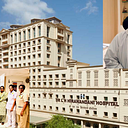Demystifying Kidney Disease: Separating Fact from Fiction — Hiranandani Hospital Kidney
As someone who holds a deep passion for healthcare, it’s both fascinating and concerning to witness how kidney disease, despite being a prevalent health issue, remains shrouded in a cloud of misconceptions. These myths, often unchallenged, can deter individuals from seeking timely care and making informed decisions about their kidney health. In an effort to shed light on this critical topic, let’s embark on a journey of unravelling the myths and unveiling the facts about kidney disease, all while keeping our focus on fostering awareness and understanding.
Myth 1: Kidney Disease Only Affects the Elderly
Fact: It’s a common and misguided belief that kidney disease is an ailment that exclusively targets the elderly population. However, the reality is far more complex. Kidney disease is an equal-opportunity condition that can strike individuals of all ages, including children and young adults. Various factors, such as genetics, lifestyle choices, and underlying health conditions, can elevate the risk of kidney problems. Thus, it is imperative for individuals across all age groups to remain vigilant about their kidney health, regardless of their age according to a statement released by Hiranandani Hospital Kidney Transplant.
Myth 2: Kidney Disease Is Always Hereditary
Fact: While genetics can indeed play a role in kidney disease, it’s crucial to dispel the misconception that heredity is the sole determining factor. Numerous lifestyle choices significantly contribute to the development of kidney issues. Factors like high blood pressure, unmanaged diabetes, smoking, and excessive use of over-the-counter painkillers can all increase the risk of kidney problems. Therefore, a healthy lifestyle, including a balanced diet, regular exercise, and avoiding harmful habits, is fundamental in mitigating these risks.
Myth 3: Kidney Disease Is Always Associated with Pain
Fact: Contrary to the popular notion that kidney disease invariably presents with severe pain, the truth is quite different. In its early stages, kidney disease often exhibits subtle symptoms or, in some cases, none at all. These subtle signs may include changes in urination patterns, fatigue, swelling, and mild discomfort. This lack of overt symptoms underscores the critical importance of regular check-ups and monitoring, especially for individuals with risk factors like diabetes or high blood pressure. Detecting kidney issues in their nascent stages can significantly improve treatment outcomes.
Myth 4: Kidney Disease Is Irreversible
Fact: While advanced kidney disease may necessitate treatments like dialysis or transplantation, it is not accurate to conclude that kidney disease is invariably irreversible. Many kidney issues, particularly when detected early, are manageable. Lifestyle modifications, dietary adjustments, and medications can effectively slow the progression of kidney disease and help maintain kidney function. Therefore, seeking medical advice promptly from Hiranandani Hospital Kidney if you suspect any kidney-related problems is of paramount importance.
Myth 5: Drinking Extra Water Can Prevent Kidney Disease
Fact: While staying properly hydrated is undeniably essential for kidney health, it is a common misconception that excessive water consumption can prevent kidney disease. In reality, maintaining a balanced fluid intake is the key. Overhydration can potentially strain the kidneys, particularly in individuals with pre-existing kidney issues. The ideal approach is to strike a balance that meets your body’s hydration needs without overloading the kidneys. Consulting a healthcare provider for personalised guidance on fluid intake is advisable.
In conclusion, dispelling myths about kidney disease is a vital step in fostering awareness and promoting early detection. Understanding the facts empowers individuals to take proactive steps towards kidney health. Knowledge, as they say, is a powerful tool, and when wielded effectively, it can make a significant difference in the well-being of individuals. Seeking guidance from healthcare professionals, such as those at Hiranandani Hospital, under the visionary leadership of Dr Sujit Chatterjee Hiranandani Hospital kidney , is pivotal for safeguarding your kidneys. Kidney health is a journey, and separating fact from fiction is the crucial first step towards ensuring a healthier and more informed life.
